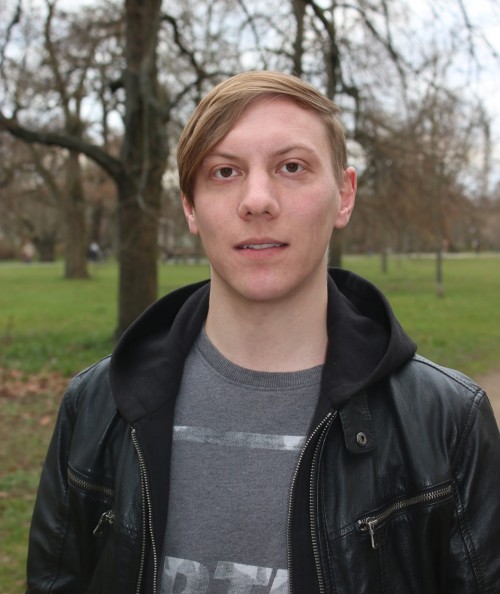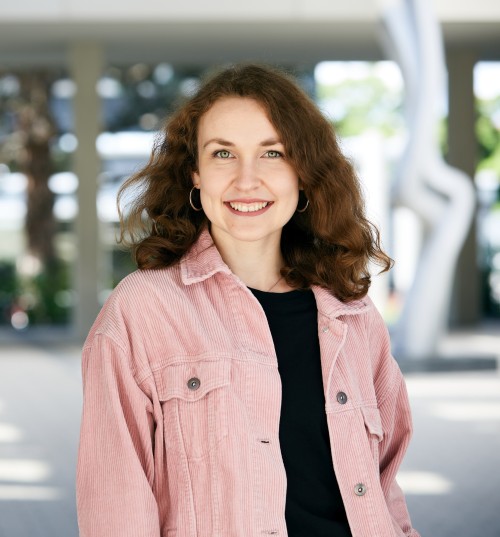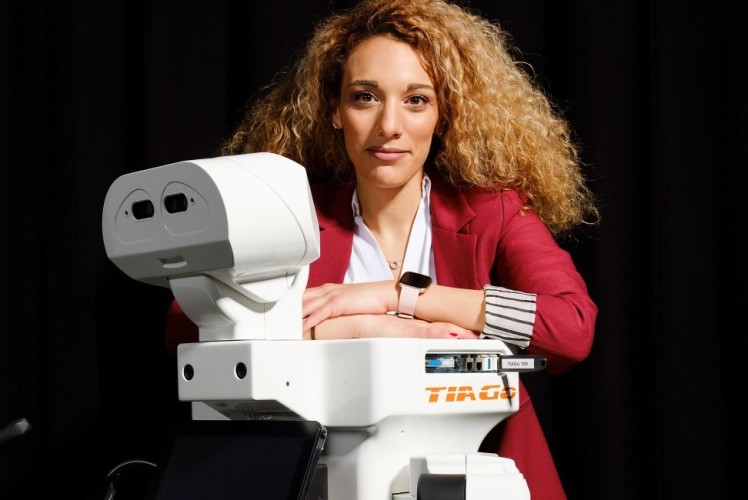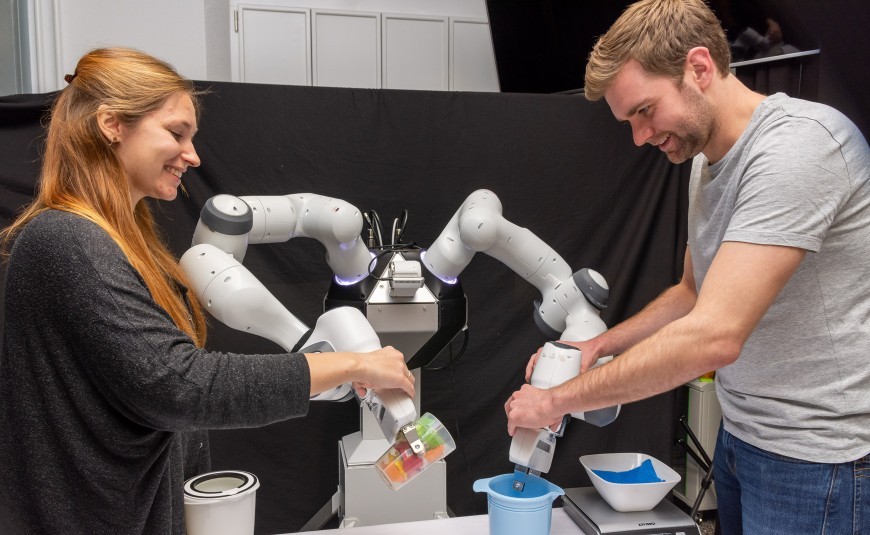Published: 29th June 2021
Daniel,
former PhD student
AI is connected to more than one would expect at first glance: Most people’s thoughts go straight to robotics, but that’s not completely correct. AI is in speech assistants or automatic credit distributors in the financial sector – the field of AI is enormous and super interdisciplinary.

What is artificial intelligence and how does AI research at TU Darmstadt look like?
In general, the subject area of artificial intelligence is the study and technique of creating intelligent machines and computer software. This is how John McCarthy, who coined the term artificial intelligence in 1955 and strongly influenced the field, defined it. We speak of AI when programmes or machines learn certain aspects. Some of these aspects, such as abstract thinking, self-taught new abilities, or independent planning is oriented at solving problems or tasks. Primarily this is about how newly learnt knowledge is applied to solve uncharted waters and expanding said knowledge. Other important aspects, that define AI, seem simple, but are highly complex at a second glance: this also accounts to navigate the world safely or to understand, translate, and apply a language. Artificial Intelligence is also an unbelievably broad field!
Therefore, at TU Darmstadt countless projects, workgroups, and subject areas work on and with artificial intelligence. A very important aspect within the different projects are collaborative research and co-operation. Some research groups of TU Darmstadt have partnered with the interdisciplinary initiative AI-DA because AI has many overlaps and connections between IT, biology, mechanical engineering, psychology, sociology, linguistics, and the list goes on. AI is connected to virtually everything! TU Darmstadt also has a leading role in the Hessian Centre for Artificial Intelligence.
Hessian Center for Artificial Intelligence
In 2020, the state of Hesse has pooled the expertise of 13 Hessian universities in its Centre for Artificial Intelligence. The main location is TU Darmstadt, which also provides the two spokespersons: Prof. Dr.-Ing. Mira Mezini and Prof. Dr. Kristian Kersting, both from the Department of Computer Science. The multi-million project with 20 additional AI professorships aims to research the third wave of AI: artificial intelligence that thinks like humans. The centre is taking a pioneering role nationally and internationally.
Daniel, who studied and received his doctorate at TU Darmstadt, explains the joint operation more explicitly: “for machines and robots to navigate independently through the world, they must understand our language and interpret it. For this we need linguists. At the same time images are important for navigation, therefore experts are needed to employ strategies to edit and process images. Furthermore, other research groups focus on how people react to machines: how does a machine have to move, interact with people, or look to be accepted? Fields from sociology and psychology play a huge role in this. And yes, even sports science is part of AI-research! For example, regarding movement and motion sequences.” Who would have thought!
AI research up close
After his bachelor’s in computer science, Daniels’s interest in artificial intelligence was awakened, which is why he decided to invest more time with this topic in his master. And at the end of his degree, machine learning couldn’t let him go. This had the consequence that Daniel went for his PhD at TU Darmstadt. The TU was already an exceptional contact point back then for all AI researchers. By now, Daniel evaluates the requirements for research as even better.
By the way: even the German chancellor Dr Angela Merkel during her visit in 2018 convinced herself personally of the quality and the AI research and validated that TU Darmstadt is “a jewel in the question of artificial intelligence” and with regard to the international competition, “that Germany can be part of the big leagues”. A tremendous honour for us and a cool statement, isn’t it?
And how exactly do you proceed in research? Daniel’s tasks were colourful, but a lot of work is at the desk: “reading current research papers, concepts and understand models as well as asking the important questions: how do you connect the models and aspects? Where can an idea or concept be improved? Where can a new building block be implemented to solve a current problem? This results in creating a hypothesis, based on that research can take place.” First tests take place on the computer until bigger hurdles are placed and then the first tests are carried out on ‘real’ robots. “This step is a very exciting step because lots can go different than expected!” says Daniel. We are impressed, with what it takes!
By now, Daniel works at a research institute of a big automobile firm and deals with AI, robotics, and human-machine interaction. Even though working in the industry is very different from university: his prior knowledge and research at TU Darmstadt have helped him a lot. We thank him for his great research insights and are thrilled to see where his professional career will take him!
Laura,
Data and Discourse Studies M.A.
What fascinated me while working with AI is that so many different partially opposite fields can utilize it. Completely new approaches are made possible and have become part of our everyday life by now.

Laura studies Data and Discourse Studies, an interdisciplinary study programme, that deals with speech analysis and connects this with digital and informational approaches – sounds interesting, and it is! Laura thinks that AI is a promising technical field and that many things concerning the economy and our private life in the future will change. “I first encountered AI in connection with speech analysis. This is how AI can for example be programmed to generate texts such as tweets”, she reports. Because her study programme is focused on humanities, she is immensely interested in the option how AI can be helpful in the research of digital humanities for example to process big data.
Polina,
Linguistic and Literary Computing M.A.
I am sure that AI will develop at a fast pace and the usage of AI will exponentially increase. I can also imagine AI influencing more and more fields, what I personally see as a big enrichment.

Polina has a background in humanities as well. In her study programme linguistics and literary computing, she has encountered AI multiple times. In the NLP (Natural Language Processing) courses that she is enrolled in, students learn what parts of language research can be automated. “For example, we have learned how a spam filter and automatic spell-check work, why Google translator doesn’t always give the same translation, or how a speech assistant gives you the impression he could understand you. And much more!” These are real everyday examples of AI in our lives, aren’t they?
Polina is especially interested in the ethical aspects that must be considered in AI research and NLP. When developing a chatbot or a voice assistant to communicate with humans, many ethical questions come up. How should they react to provocation, manipulation, or insult? How do they deal with hate speech? How should they avoid or at least minimize various biases, i.e., prejudice or assumptions that are automatically learned by the AI as a by-product from the available data? These exciting questions are the subject of lively discussions in AI research.
Dr. Georgia Chalvatzaki,
research group leader of the iROSA lab
My research vision is to build on these significant advances to finally achieve the vision of embodied AI systems that assist humans with everyday tasks.

When we think of robots, we often think of humanoid assistants: Who hasn't imagined a robot cooking, cleaning, and tidying up so that we ourselves have more free time?! Dr. Georgia Chalvatzaki and her team iROSA at TU Darmstadt are trying to get a little closer to this dream. “I grew up watching cartoons with Robots like Rosey from the Jetsons. I imagined how extraordinary our lives would be if we had robotic assistants taking care of the house and the elderly, giving us more time for education, hobbies, and time with family and friends.” Unfortunately, we are not yet that far today, because future assistance robots with artificial intelligence will have to perform many different tasks in the household independently and interact reliably with humans. So far, there has been a lot of progress in research in the field of AI and robotics, the navigation of mobile robots and the moving or operating of objects also works quite well already, but it is still limited to certain objects and very specialised in individual tasks. That is why Georgia Chalvatzaki continues to work on her big dream: “In iROSA, we build methods that combine AI and classical robotics to allow our robots to perceive the real world, interact with objects around them and learn to execute household tasks, like collecting toys thrown on the floor or setting up dinner tables. Also, we try to model human behaviour to learn to adapt to human needs. We are already convinced that we absolutely need such a robot soon!
Is your interest piqued? We have provided you with some interesting links on the topic that will help you if you are interested in AI, machine learning, and other interesting topics surrounding AI. Are you even more interested in the technical requirements and physical robots on which the programmes will run? Then be sure to check out our blog posts on the subject areas of mechanical engineering and electrical engineering!
Study programmes around artificial intelligence
Of course, most people immediately think of computer science when they think of robots and artificial intelligence. But the topic is so relevant across the entire board, that in addition to the classic study programmes in computer science, information systems technology, and mechanical engineering, many other departments also offer courses of study, lectures, and research projects related to AI. Here is a selection of study programmes that deal with AI, among other things:
- Computer Science B.Sc. / M.Sc. – Computer science deals with the representation, storage, transmission, and systematic processing of information. In addition to math, the curriculum includes the analysis, design, adaptation, and application of communication and information systems.
- Autonomous Systems M.Sc. – This specialized master's programme focuses on the fundamentals and applications of technical autonomous systems, such as intelligent robots, characterized by various sensor-based perceptual and actuator-based physical interaction capabilities.
- Linguistic and Literary Computing M.A. – This bilingual programme provides knowledge of digital resources, infrastructures, and processes in conjunction with philological theories and approaches. The programme has a philological-linguistic as well as a literary approach.
- Cognitive Science B.A. – Cognitive science assumes that the human mind is essentially an information processing system. Cognitive scientists seek to understand how the mind processes information to produce intelligent behaviour. They describe human behaviour using methods from experimental psychology and computer science and seek to understand basic information processing.
- Mechanical Engineering B.Sc. / M.Sc. – This involves the design and construction of all types of machinery and equipment. A sound basic education in mathematics and mechanics through materials science, mechatronics, computer-aided design, and thermodynamics opens many choices for you later to build your own profile according to your individual interests.
- Electrical Engineering and Information Technology B.A./M.Sc. – Here students learn the planning and realization of electrical engineering and information technology components and systems. In the first four semesters, you will receive a broad scientific education in mathematical, scientific, and technical basics, so you will be trained to become real all-rounders.
- Internet and Web-based Systems M.Sc. – Here the focus is on global networks because these are a central component of complex IT-supported systems and are increasingly part of our professional and everyday culture. In the elective area, you can deepen your knowledge in the topics of information and language processing and web and text-based systems, among others.
- Information Systems Technology B.Sc. – This degree programme is interdisciplinary and forms the interface of computer science, electrical engineering, and information technology. Here, the focus is on complex information systems as we use them in everyday products every day.
- Visual Computing M.Sc. – This programme deepens skills and knowledge of information processing, particularly in digital images and visual models.
- Technology and Philosophy M.A. – Graduates of engineering, science, or mathematics majors can expand their technology skills with this master's degree programme. The focus is on content such as philosophy of technology and ethics of technology, as well as understanding issues of technology design with all its social and environmental implications.
- Data and Discourse Studies M.A. – This interdisciplinary and international programme focuses on and analyses discourse, the relationship between language, knowledge, and society. The focus is on research data in the form of spoken language and written texts, which are analysed using digital and informatics approaches, for example in the field of linguistic analysis.
Quite a lot, isn't it? In addition, many other courses of study, such as physics, biology, linguistics, philosophy, or psychology, deal in part with artificial intelligence or offer an entry into the field! Just check out your department if this fascinating topic has piqued your interest.

Daniel, Computer Science
Hello, I’m Daniel and I spent my time at the Department of Computer Science at TU Darmstadt between 2008 and 2020. After my Bachelor's, Master's and PhD, I'm now a Senior Scientist at Honda Research Institute Europe. My research interests lie in artificial intelligence and robotics and that’s also why I spent so much time at TU, which boasts a unique breadth (and depth) in this field.

Laura
Hello, my name is Laura and I study Data and Discourse Studies. I chose this degree programme because I am very interested in combining computer science tools with research in the humanities. Moreover, the degree programme is the only one of its kind in the world.

Polina
Hi, I’m Polina and I’m studying the master program “Linguistic and Literary Computing”. The study program is very interdisciplinary, which is challenging and fascinating at the same time. Furthermore, it offers excellent future perspectives. I like this mix of the linguistics and computer science, and also the possibility to study in two languages – German and English.







